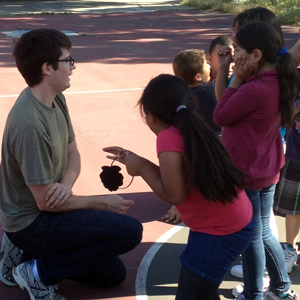By Lyssa Mudd Rome

On a recent afternoon at BAHIA, a bilingual after school program in Berkeley, a small group of elementary school kids ran around breathlessly. They were playing “wolves and bunnies,” a tag game that takes some of its rules from basketball. Their coach Todd Whitehead played along, occasionally giving directions and stretching his hand out for a high-five. “Todd makes basketball seem fun,” said nine-year-old Kaydie. But this is about more than having fun. It’s a way for these kids to get the exercise they need.
Whitehead is a post-doctoral scholar in public health at U.C. Berkeley who has been coaching at BAHIA for three years. “My main goal,” he says, “is for the kids to have fun, get healthy, and get exposed to activities that will keep them healthy as they grow up.”
The Center for Disease Control (CDC) recommends that children get at least an hour of physical activity a day. But for many kids, that isn’t happening. Budget cuts in California have meant there often isn’t enough money for schools to offer PE or include sports in their after school programs. On top of that, low-income neighborhoods frequently lack parks or other safe places to play. Organized sports activities are limited.
That’s where Coaching Corps comes in. Whitehead volunteered to serve at BAHIA through the nonprofit program, which connects college-age coaches with kids from low-income neighborhoods. Here’s how it works: Coaching Corps chapters recruit volunteers from colleges, universities, and the community, then train them to be coaches. The organization then places coaches in existing after school programs in under-served areas. So far, around 1,600 coaches and 19,000 kids have participated.